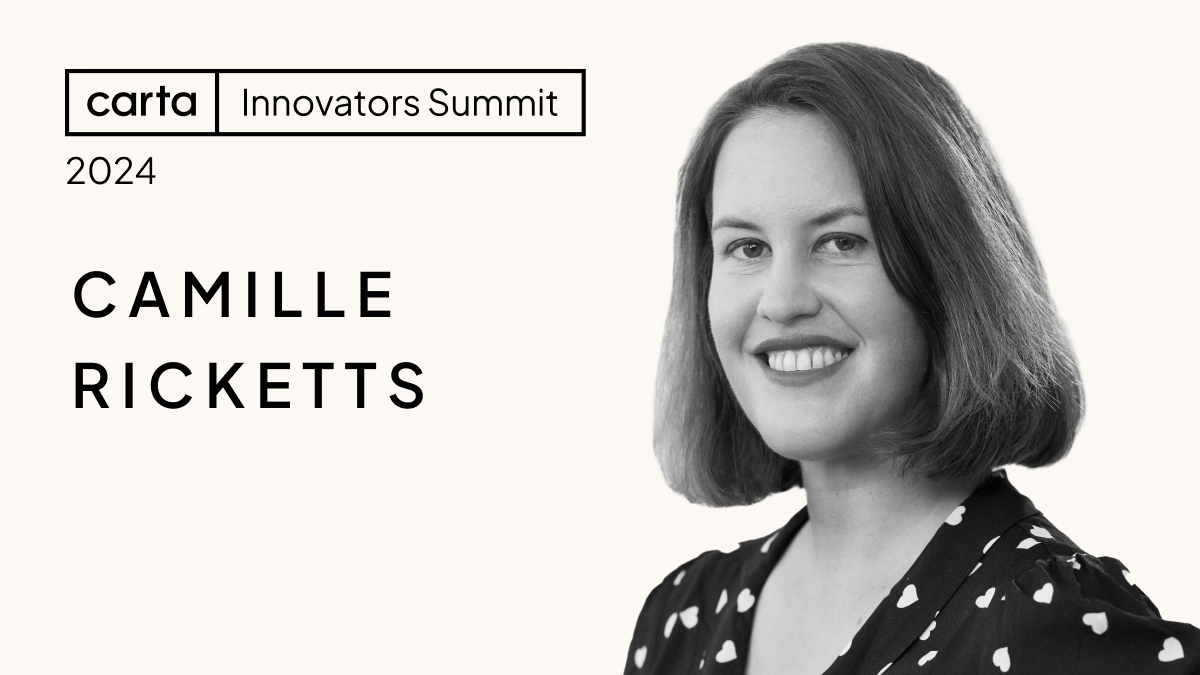Great storytelling is all about knowing your audience, says Camille Ricketts, marketing partner at Emergence Capital. In order to tell the stories that resonate with your customers—and build products that will help them—you need to understand your audience deeply.
At Emergence Capital, Camille helps portfolio companies find, shape, and share their stories. Before Emergence, Camille led marketing at Notion, where, as the first marketing hire, she built out the early team, and helped launch one of the biggest global communities around any software product (now more than one million strong in 50+ countries).
Prior to Notion, she was head of marketing and content at First Round Capital, where she started the First Round Review. Camille’s career journey has taken her to the White House, where she worked on U.S. Digital Services during the Obama administration, to managing communications in the early days of Tesla, to The Wall Street Journal. The throughline of all these experiences has been storytelling.
Camille recently joined Carta’s Innovators Summit for a panel on “Innovative Approaches to Go-To-Market” and sat down with Carta for a deep dive on the subject. Among the topics discussed:
-
Knowing your audience
-
Painkillers vs vitamins
-
Making your first marketing hire
-
Building unconventional teams

Carta: As a marketing partner at Emergence Capital, you’re helping B2B companies tell their stories. Tell us a bit about the work you’re doing now and what excites you about enterprise software.
Camille Ricketts: Emergence is a very long-standing firm; it was founded in 2003, so we just passed our 20th anniversary. And one of the things that helped the firm succeed to the extent that it has—the returns are incredible here—is the level of focus that they've brought to this work. Emergence only really invests in enterprise software, and that allows them to really get to know and really help folks who are building that type of technology.
B2B software in particular depends a lot on storytelling. A lot of it is very complex. A lot of it needs to be positioned for potential users. They need to understand really clearly what the software is going to do for them, what impact it's going to have in terms of ROI, saving cost, or saving time. And how those efficiencies then pay forward into the type of growth that they want to see and maybe even pays itself forward into them having better lives outside of work.
There are a lot of really rich stories to be told, even though that might not seem to be the case on the surface. And it’s an interesting intellectual challenge every day, to really think about the impact that software is having on almost every industry that we touch day to day.
A lot of people, when they think of marketing, think of their experiences getting marketed to as a consumer—seeing commercials on TV or ads on Instagram. Less often we think about marketing for enterprise companies. How is marketing for B2B different from other sorts of marketing?
B2B marketing is very different from consumer marketing in the sense that a lot of it is just very niche. You are selling to a very particular person. So your audience has contours, and knowing exactly what those are, what they experience day to day, what is frustrating to them, what's causing them a ton of pain, what they feel is costing them time, money, energy, growth—all of that becomes incredibly important for deciding which story to tell.
And especially with enterprise software and technology products, there's this “vitamin versus painkiller” dichotomy. A piece of software can make your life slightly more convenient, slightly more delightful, a little bit prettier, and so on—and that's your garden-variety vitamin. And a lot of products actually fall into that category. And then you have your painkillers, which actually touch the nerve of something that is really hideous to deal with each and every day or is incredibly expensive in some way. Marketing for B2B products has to convey the painkilling properties of that particular product. It's very seldom that a vitamin succeeds wildly.
The topic of your panel at Carta's Innovators Summit was go-to-market strategy. When you first start working with an early-stage portfolio company, what is top of mind?
The number one thing that we always start with is audience. How well do they understand their audience? How have they gleaned all of that? Have they talked to enough prospective customers?
I always recommend doing something called the Jobs to Be Done questionnaire, which really gets a clear sense of: What are the things that your product has to deliver for these people? What jobs do they need done? And is your product—and the way you're describing your product, the way you're positioning it, the way that you're marketing it—meeting those pains and jobs and needs?
There's a really excellent framework called the Value Proposition Canvas, developed by Dr. Alex Osterwalder. It provides this format that's really clear, where you’re eliciting from your customers in these interviews: What are the pains that they're experiencing and the gains that they find aspirational? What gets them promoted? What gets them more time with their kids at night? And then the pains, like having to use a really clunky piece of software that makes something take two hours longer than it should. Can you make sure that the features of your products are, in fact, killing those pains and facilitating those gains? And I find that framework to be a really good building block.
What advice do you have for founders looking to make their first marketing hire?
When I talk to founders about who they should be hiring for that first role, I very openly say that I am not the profile that one should usually contemplate. I think that I have some aspects of what I would recommend in that first hire, including someone with incredible effusive enthusiasm for the product, for the concept of building a team, and having that trust placed in them. Also, somebody who matches the vibe and can mindmeld with the founder. I think a good litmus test for that is during the interview process, can you do a whiteboarding session together and feel like you've gotten to the level of nerding out? Where you’re both like, “Oh, and then we could do this, and then we could do that.” That's an underestimated feeling in a recruiting process that you want to be looking for.
But for the most part, I do recommend that folks find a product marketer as their first hire. Because that's the person who is probably the most well-rounded athlete of the marketing world and is going to be the best positioned to speak to a bunch of customers, glean from them all of the things that we've talked about, and then translate that into messaging for the product. So that's generally who I recommend.
I've seen some companies take the step of hiring somebody more growth-oriented because they think to themselves, “We have product-market fit, let's grow, grow, grow.” But none of those growth mechanisms are going to really drive what they want if the messaging is not quite right.
And then when someone is hired for that job, someone who is the first marketing hire at a startup, what advice do you have for them?
Beyond that audience exploration and positioning exercise, I would encourage anyone in that role to draw out their funnel and really think it through. Literally draw it on either a big piece of paper or whiteboard and think about: What are the things that are going to get people into the top of this funnel? Where do our audience members actually live in the world? Where do they go? Who do they listen to? What do they interact with?
And then, do you have a product that people need to consider before they purchase? Is there a significant consideration phase? Are they going to try it before they buy? Do you need to worry about activating them before they actually purchase? Really get yourself familiar with those stages.
Now that you have delineated that, the next question is: What are the tactical marketing levers you have at your disposal at each phase of the funnel? Maybe somebody is aware of you, they've come to your website—now how do you get them into a webinar? And then once they've been to a webinar, how can you nurture them to purchase? Drawing this out for yourself really clarifies the mind around all the things that are necessary. And then you can kind of stack-rank all of those tactics into priorities.
Any more advice for approaching go-to-market?
One thing that comes to mind is with hiring. The team that I built at Notion was really nontraditional, I think, because I was a nontraditional pick for this role. For example, my first hire on the team was this incredible community leader, Ben Lang. But he hadn't really had the verbatim title of community before in his life. Or one of the first designers to join the team was a “designer who could code”—literally, that was Cory Etzkorn’s title, “designer who can code.”
So one of my big recommendations would be to not feel like you have to stick so closely to the formulas of how this thing should go or the titles that need to be involved based on what you've seen other organizations do. It's really about knowing what needs to get done at any given point, and finding the person who is just so gosh-darn excited and hungry to do that thing, even if they haven’t done it before. You’ll want to know that they have a baseline of intellectual horsepower and ability, and that they have the desire to grow in their role and become the best at it. That's an excellent hiring strategy versus just looking at LinkedIn and being like, “Well, it looks like they've done demand-gen before.”
